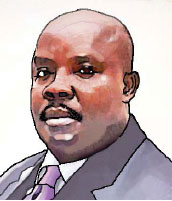Since last April, members of the Indigenous Peoples of Biafra (IPOB) have been appealing to the Igbo all over the country and beyond to set aside May 30, as a day to remember their relations that had lost their lives in various instances of oppression against the people by the Nigerian system.
This is not the first time the leadership of the organisation would be making the call. In fact, in the last couple of years, the exercise has become more of a ritual. Part of the activities is a directive on the people to sit at home that day. By that, the Igbo, whether members of IPOB or not are prevailed upon to stay off their business or commercial activities as mark of respect to their brothers and sisters killed in the 1967 – 1970 civil war and other occasions that had to do with the Igbo self-determination agenda.
Fidelity to the appeal by the people, had varied in the past. In some instances, it had been thorough. In others, it had not achieved same result.
It is perhaps, in a bid to achieve total success in this year’s edition, that account for the early commencement of the announcement.
This year’s exercise is significant in a way. It marks 50 years of the declaration of the defunct Peoples Republic of Biafra by the late General Chukwuemeka Odumegwu-Ojukwu. It also tallies with the 50 years of the declaration of the civil war that resulted to the loss of more than two million Biafrans and total destruction of the zone by the federal forces.
For IPOB activists, therefore, the success of the exercise means a lot, especially as there is hardly any family in Igboland that did not experience loss or displacement, one way or the other, on account of the war. That is as far as the war is concerned.
But to the people, there is not much to suggest that the war is completely over. Yes, the field hostilities may have been over and the guns, no longer booming. But they still see war directed at them by the government from various angles. This is why the IPOB, leading the new phase of Biafra actualisation agenda, raises serious concern.
Ordinarily, that revalidation agenda should have been driven by those who saw action in the days preceding and during the conflagration of 1967 to 1970; those who knew what the Biafra Dream represented and what they stood to gain from it if it did not encounter its sunset at dawn.
But the present day agitators for Biafran Independence are mostly young men and women, who never knew anything about the defunct entity, except what they may have gleaned from story books or tales from their parents and elderly ones.
These stories, incidentally, are usually subjected to serious editing, obviously to dissuade the listeners from being drawn into similar exercise, apparently on account of the ugly experiences that trailed the engagement.
If you then take it on the face value, you can see the difficulty in understanding why many South East youths have not been successfully steered from their growing attachment to Biafra. For one, the geographical environment that constituted the defunct Republic is no longer intact.
The situations now cannot also be said to have strictly matched what it was when Ojukwu declared Biafra on May 30, 1967. But the fire burns in the youths and their mental picture gets enlarged every day. This is not without reasons.
Coming from the ashes of the field hostilities in 1970, the Igbo were meant to believe that the war was over. They were promised reconciliation, rehabilitation and reconstruction.
Even with obvious insincerity in implementing the policy as demonstrated in the paltry Twenty Pounds handed to each of them with deposits in the banks, regardless the volume of money previously kept, they bore their pains with dignity.
They rather believed that Nigeria had learnt its lessons. Some even went as far as giving their children such name as Oguebego (the war is over), not as mark of cowardice but in forging a new beginning.
It is these children that are now asking questions and raising issues on unpleasant developments around them. They see in their region of birth abandoned or dilapidated federal government projects.
When they cannot move freely between Onitsha and Enugu on account of the death trap that the expressway has turned to, aside other incidences of insecurity; when the same fate confronts them on Enugu-Port Harcourt highway; when they are being forced to connect flights from other zones to fly out of the country due to non-functional international airport in their area, their disillusionment in the country, easily finds expression.
When they are discriminated against in job recruitments and placements, admissions into federal institutions not on the basis of merit but because of the so-called quota system, you would see why their belief in the system is seriously shaken.
Most painfully, when they are treated as second class citizens in places where they live and fulfil their civic obligations, it can be understood why their anger knows no bound.
It is on this context that the call by IPOB on the Igbo for the remembrance of their kinsmen and women that sacrificed their lives in defending their dignity in the face of massive onslaught by monstrous federal troops and their mindless international collaborators, could be understood.
Observing the day, should not, of course, provide basis for hoodlums to disturb the peace of those with different opinion. The occasion should also not offer reasons for Nigeria’s military, to once again, see the South East and surrounding states as veritable grounds for experimenting the capability of its marksmen or efficacy of its weaponry.
The report by Amnesty International, in the dying days of last year on the atrocities of the Nigerian Army against members of IPOB between August 2015 and August 2016 is still fresh in the consciousness of men and women of goodwill across the globe. It put members of IPOB killed by the soldiers within the period at over 150.
The report was based on analysis of 87 videos, 122 photographs and 146 eyewitness testimonies, all revealing soldiers firing live ammunition to disperse IPOB members.
A chilling aspect of the report was on how, at least 60 defenceless IPOB protesters were shot dead within two days leading to the Biafra Remembrance Day of May 29, 2016.
It also captured the gory incidence of massacre of the members of the organisation in Aba, Abia State, earlier in February.
This is the type of news that works against Nigeria’s reputation abroad and alienates it from its citizens. The government should guard against it this year.













